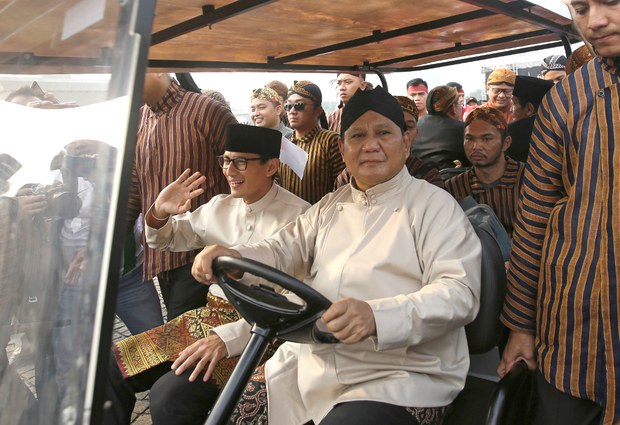Presidential Contender in Indonesia Might Review China-funded Projects if Elected
2018.10.24
Jakarta
 Indonesian presidential candidate Prabowo Subianto (right) rides a golf cart with running mate Sandiaga Uno in Jakarta, Sept. 23, 2018.
Indonesian presidential candidate Prabowo Subianto (right) rides a golf cart with running mate Sandiaga Uno in Jakarta, Sept. 23, 2018.
Indonesia may review China-backed infrastructure projects if opposition leader Prabowo Subianto is elected president next year, officials with his campaign team said Wednesday.
Incumbent President Joko “Jokowi” Widodo, who is seeking re-election, has embraced China’s ambitious “One Belt, One Road” initiative and has made upgrading the country’s dilapidated infrastructure a priority during his first term in office. Jokowi will face Prabowo, a former Army special forces commander with a checkered human rights record, in the presidential election scheduled for April 17 next year.
“Some projects may be evaluated for necessity, but not necessarily be cancelled,” said Andre Rosiade, a spokesman for Prabowo’s Gerindra Party, responding to questions from BenarNews about whether Prabowo would review Chinese-backed projects if he won the presidency.
“Mr. Prabowo isn’t anti-foreigner and is ready to work with foreign countries, but the welfare of Indonesians is his priority.”
Andre did not say which project would be reviewed.
“We will not review a project just because it is funded by a certain country. Projects that will be reviewed are those that cause losses to the state and undermine the nation,” said Dahnil Anzar Simanjuntak, Prabowo’s campaign spokesman.
“Mr Prabowo is against corruption and manipulative practices, but he can work with investors from any country,” he said.
Indonesia is building a 140-kilometer (87-mile) high-speed railway and several power plants on Sumatra and Kalimantan islands with funding from China.
The railway, which links the city of Bandung in West Java and Jakarta, costs U.S. $5.9 billion and is being built by a consortium led by China Railway International, according to information from the Indonesian government’s National Investment Coordination Board.
Jokowi launched the project in early 2016 to much fanfare but construction was delayed for about two years due to problems in freeing land, among other issues.
China is also funding the development of “economic development corridors,” which involve the construction of industrial estates, power plants, roads and sea ports worth U.S. $51 billion in North Sumatra, North Kalimantan, North Sulawesi and Bali, according to the National Investment Coordinating Agency.
“Indonesia and China have a good relationship, but I think there are certain projects that we want to look at,” Hashim Djojohadikusumo, who is Prabowo’s brother and campaign manager, told the South China Post on Monday, referring to One Belt, One Road.
“I’m sure there are some projects that are very good, and I’m sure some projects are not necessary.”
![181024-ID-politics-INSIDE-620.JPG Indonesian President Joko Widodo (left) and Chinese counterpart Xi Jinping walk to their meeting at the Great Hall of People in Beijing, as China was touting its new One Belt, One Road endeavor as “a project of the century,” May 14, 2017. [AFP]](/english/news/indonesian/indonesia-china-10242018171047.html/181024-ID-politics-INSIDE-620.JPG/@@images/13a697d4-d7b0-489b-a195-92bc4752d7bd.jpeg)
Beijing’s geopolitical plan
Last year, Jokowi attended a two-day One Belt, One Road forum, during which Beijing laid out its plans to invest more than U.S. $1 trillion in its grand strategy of building a network of ports, roads, railways and other logistics-related projects stretching through Southeast Asia, South Asia and beyond.
A so-called Maritime Silk Road is part of China’s multi-pronged strategy to boost its global trading links by developing overland and maritime routes connecting the world’s most populous nation and economic powerhouse to markets in Europe.
China and Indonesia established diplomatic relations on April 13, 1950. In 2003, bilateral trade reached U.S. $3.8 billion, but that figure multiplied almost 10 times to U.S. $36.1 billion in 2010, according to the International Institute for Sustainable Development, a Canada-based independent think-tank.
But Jakarta booked a trade deficit of U.S. $ 14 billion in 2016, with the trade imbalance favoring Beijing. Trade between the two nations peaked at U.S. $58.8 billion last year, with Indonesia importing about U.S. $35.7 billion of goods from China, mostly electronics, including phones and computers, according to official figures. Indonesia exported mostly coal briquettes, steel and palm oil.
Indonesia ranks fourth among China’s largest trading partners in Southeast Asia, after Malaysia, Singapore and Thailand.
Jokowi said in 2017 that he believed the One Belt, One Road initiative would strengthen economic relationships between China and Indonesia, and his government was focusing on its infrastructure development.
Chinese regional rival India has expressed misgivings about China’s geo-political strategy, saying initiatives must be based on universally recognized international norms, transparency and equality.
Tread carefully, analyst says
Ari Kuncoro, an economist at the University of Indonesia, warned that abandoning a project after construction had started would be costly.
“Any decision to review should be made carefully,” Ari said. “A project should only be postponed when import content is so high that it hurts the local currency.”
“Cancelling a projects that are already underway means that cost that has already been incurred can’t be recovered,” he said.
The Indonesian government has already decided to postpone some infrastructure projects that use heavily imported materials for up to six years as part of attempts to shore up the rupiah, which has tumbled almost 10 percent this year and weakened past 15,000 per U.S. dollar for the first time in 20 years.
Agung Pribadi, a spokesman for the Energy and Mineral Resources Ministry, said several power plant projects had been postponed but he did not give details.
Officials at the state electricity company PLN could not be reached for comment.
“With the United States isolating itself, I think the new Silk Road makes sense,” Ari said.
“Indonesia has a population of 260 million people and it’s close to Singapore, so when the ports in Singapore are overwhelmed, we can take some of the excess traffic,” he said.
But Indonesia should avoid being just a market for Chinese exports.
“We should not accept such a situation,” he said.







